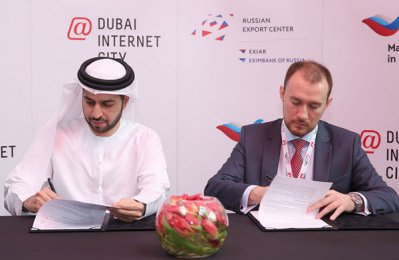Dubai Internet City (DIC) has signed an agreement with the Russian Export Centre (REC) to launch the first Russian Centre for Digital Innovations and Information and Communication Technologies outside Russia, in Dubai.
The centre which will encompass of a space of over 20,000 sq ft within Dubai Internet City, is the first of four global centres, and the first-ever commitment to investment promotion of this scale by Russia abroad, reported Emirates news agency Wam.
The memorandum of understanding (MoU) was signed by Ammar Al Malik, managing director at Dubai Internet City and Dubai Outsource City; and Marat Korovaev, head of IT Export Support Department at Russian Export Centre; during Gitex Technology Week 2018.
Al Malik said: "The UAE and Russia have shared close business ties for decades, and for DIC to be chosen as the first overseas destination by Russian Export Centre is a true testament to Dubai’s key position as a global business destination. As the largest hub and leading community of technology innovators in the region, DIC is supporting the emirate in attracting more international enterprises of all sizes."
Korovaev added: "Long-standing bilateral ties, favourable and simplified business processes, and a nurturing environment that promotes ideation and exchange of knowledge and best practices, are key factors that impelled us to choose Dubai and DIC as the first destination for our four planned centres outside Russia. Eighty-three percent of our customers are SMEs and DIC’s holistic approach to supporting its business partners, from startups to well-established enterprises, was another factor that influenced our decision."
Apart from the centre, the Russian Export Centre and DIC will jointly work to support Russia and UAE based technology companies of all sizes, including startups and entrepreneurs and further support DIC’s commitment to providing a thriving ecosystem for companies.
The opening of the centre comes at a time when the UAE and Russia enjoy heightened trade relationships and a reported growth in trade between both countries to $1.2 billion in 2017.
World’s first Russian digital centre to open in Dubai

Image courtesy: WAM

&uuid=(email))